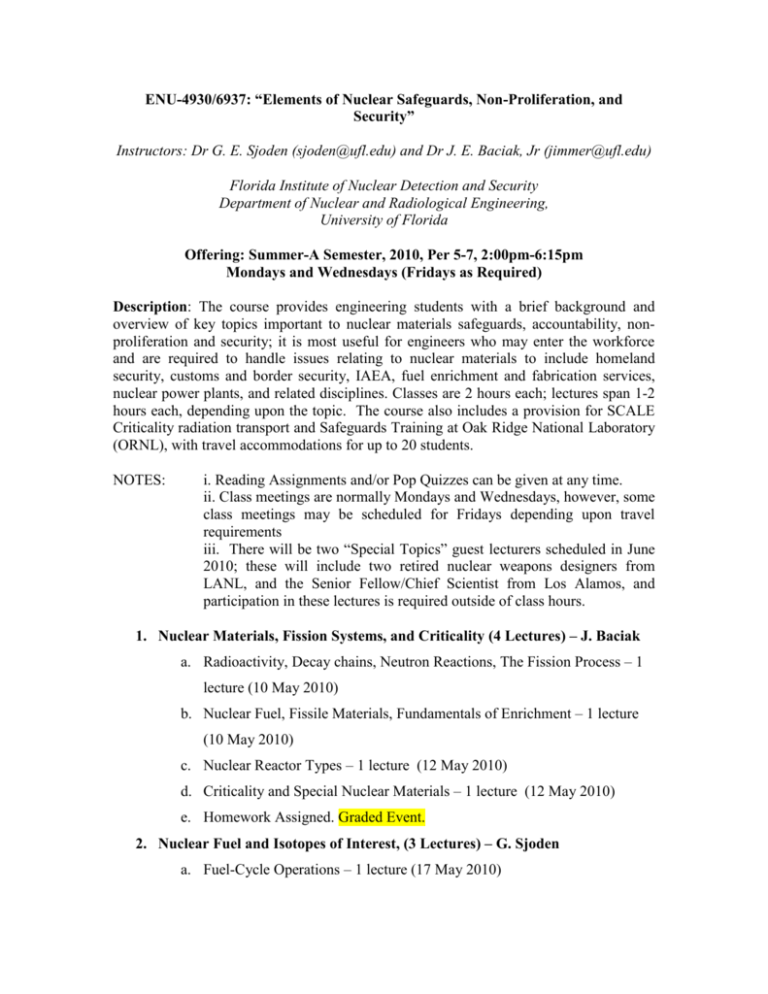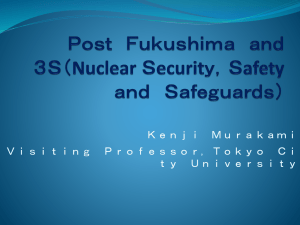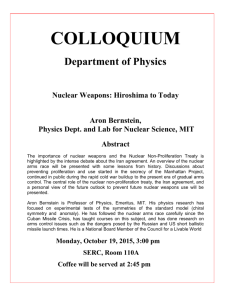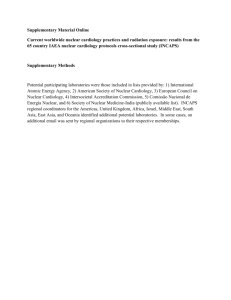safeguards-course-outline-rev4 - plaza
advertisement

ENU-4930/6937: “Elements of Nuclear Safeguards, Non-Proliferation, and Security” Instructors: Dr G. E. Sjoden (sjoden@ufl.edu) and Dr J. E. Baciak, Jr (jimmer@ufl.edu) Florida Institute of Nuclear Detection and Security Department of Nuclear and Radiological Engineering, University of Florida Offering: Summer-A Semester, 2010, Per 5-7, 2:00pm-6:15pm Mondays and Wednesdays (Fridays as Required) Description: The course provides engineering students with a brief background and overview of key topics important to nuclear materials safeguards, accountability, nonproliferation and security; it is most useful for engineers who may enter the workforce and are required to handle issues relating to nuclear materials to include homeland security, customs and border security, IAEA, fuel enrichment and fabrication services, nuclear power plants, and related disciplines. Classes are 2 hours each; lectures span 1-2 hours each, depending upon the topic. The course also includes a provision for SCALE Criticality radiation transport and Safeguards Training at Oak Ridge National Laboratory (ORNL), with travel accommodations for up to 20 students. NOTES: i. Reading Assignments and/or Pop Quizzes can be given at any time. ii. Class meetings are normally Mondays and Wednesdays, however, some class meetings may be scheduled for Fridays depending upon travel requirements iii. There will be two “Special Topics” guest lecturers scheduled in June 2010; these will include two retired nuclear weapons designers from LANL, and the Senior Fellow/Chief Scientist from Los Alamos, and participation in these lectures is required outside of class hours. 1. Nuclear Materials, Fission Systems, and Criticality (4 Lectures) – J. Baciak a. Radioactivity, Decay chains, Neutron Reactions, The Fission Process – 1 lecture (10 May 2010) b. Nuclear Fuel, Fissile Materials, Fundamentals of Enrichment – 1 lecture (10 May 2010) c. Nuclear Reactor Types – 1 lecture (12 May 2010) d. Criticality and Special Nuclear Materials – 1 lecture (12 May 2010) e. Homework Assigned. Graded Event. 2. Nuclear Fuel and Isotopes of Interest, (3 Lectures) – G. Sjoden a. Fuel-Cycle Operations – 1 lecture (17 May 2010) b. Fuel Reprocessing, Isotope Separation Methods - 2 – lectures (17 May 2010) 3. Introduction to Computational Methods, (4 Lectures) – G. Sjoden a. Boltzmann Equation, Neutron balance, keff - ½ Lecture, (19 May 2010) b. Deterministic and Monte Carlo Methods – ½ Lecture. (19 May 2010) c. Cross sections, nuclear data, and the role of RSICC - ½ Lecture (19 May 2010) d. Criticality computer lab exercise using transport theory - ½ Lecture (19 May 2010); Students MUST have a LAPTOP to use. Graded Event. e. Burnup and transmutation modeling – ½ Lecture (24 May 2010) f. 3-D Burnup with parallel computing demonstration - ½ Lecture (24 May 2010) g. Shielding and general computational methods in nuclear applications – 1 Lecture (24 May 2010) h. Shielding computer lab exercise using transport theory - ½ Lecture (24 May 2010); Students MUST have a LAPTOP to use. Graded Event. 4. Group EXAM – Mid-term (26 May 10) 5. Review of Fundamentals in Radiation Detection, (2 Lectures) – J. Baciak a. Detector Types (alpha, beta, gamma, neutron), Radiation assay – ½ Lecture, (02 June 2010) b. Counting Statistics and efficiency – ½ Lecture, (02 June 2010) c. Neutron multiplicity, coincidence counting – 1 Lecture, (02 June 2010) d. Homework Assigned. Graded Event. 6. Advanced Materials Analysis, (5 Lectures) – J. Baciak & G. Sjoden a. Mass Spectroscopy: TIMS, ICP-MS, TOF-MS – 1 Lecture (07 June 2010), J. Baciak b. Detection of Nuclear Materials by Other Means (stack monitoring, Xe-133 monitoring, seismic) – 1 Lecture (07 June 2010), J. Baciak c. Monitoring using detection (ref: PANDA Manual) – 2 Lectures (09 June 2010), G. Sjoden i. Inventory Control ii. Reprocessing iii. Fissile Material Detection iv. Countering Illicit Trafficking d. Special Topics (Graded Group Project/Activity) – 1 Lecture (09 June 2010) e. Detector Lab, and Factors affecting radiation detection performance – To Be Scheduled Outside of Normal Class Time. f. Homework Assigned. Graded Event. 7. Non-Proliferation, International Safeguards, and the role of the IAEA (4 Lectures) – G. Sjoden and J. Baciak a. Test Ban Treaties and the Nuclear Non-proliferation Treaty - ½ Lecture, (14 June 2010), G. Sjoden b. Safeguards agreements and Non-Proliferation Research - ½ Lecture, (14 June 2010), G. Sjoden c. International Convention for the Suppression of Acts of Nuclear Terrorism - ½ Lecture, (14 June 2010), G. Sjoden d. UN Security Council resolutions and International Law - ½ Lecture, (14 June 2010), G. Sjoden e. Homework Assigned. Graded Event. f. IAEA Safeguards Program and Convention on Physical Protection of Nuclear Materials (CPPNM) - ½ Lecture, (16 June 2010), J. Baciak g. Nuclear forensics and the prevention of illicit trafficking of nuclear material – 1 Lecture, (16 June 2010), J. Baciak h. Nuclear Fuel Material Inventory/Materials Accountability and Control – ½ Lecture, (16 June 2010), J. Baciak/G. Sjoden i. Final Graded Event. 8. SCALE and Safeguards Lab Training at ORNL (21- 25 June 2010) a. 5 Days at ORNL, 7 days total travel b. Travel will be limited by funding, maximum capacity, US citizenship; 20 students maximum c. Prior Coordination of names, SSANs, birth, etc. will be required. UF College of Engineering Standard Syllabus ENU-4930/6937: “Elements of Nuclear Safeguards, Non-Proliferation, and Security” Instructors: Dr. G. E. Sjoden (sjoden@ufl.edu), and Dr J. E. Baciak, Jr (jimmer@ufl.edu), Florida Institute of Nuclear Detection and Security, Department of Nuclear and Radiological Engineering, University of Florida Offering: Summer-A Semester, 2010, Per 5-7, 2:00pm - 6:15pm Mondays and Wednesdays (Fridays as Required) Description: The course provides engineering students with a brief background and overview of key topics important to nuclear materials safeguards, accountability, nonproliferation and security; it is most useful for engineers who may enter the workforce and are required to handle issues relating to nuclear materials to include homeland security, customs and border security, IAEA, fuel enrichment and fabrication services, nuclear power plants, and related disciplines. Classes are 2 hours each; lectures span 1-2 hours each, depending upon the topic. The course also includes a provision for SCALE Criticality radiation transport and Safeguards Training at Oak Ridge National Laboratory (ORNL), with travel accommodations for up to 20 students. Prerequisites: MAP 2302, PHYS 2049. Course Objectives: To become familiar with topics important to nuclear materials safeguards, accountability, non-proliferation and security, and participate in knowledge enhancing events and exercises regarding information pertaining to nuclear technology. Required Text and Software: Nuclear Safeguards, Security, and Non-Proliferation, J. E. Doyle, ed., ISBN 978-0-7506-8673-0 Grading: Homework/Graded Events (40%) Class Participation and Attendance (10%) Pop Quizzes (10%) Mid-Term Exam (20%) Final Graded Event (20%) The standard UF (+/-) grade scale will be used. Prepared by: Glenn E. Sjoden and J. E. Baciak, Jr Summer, 2010






